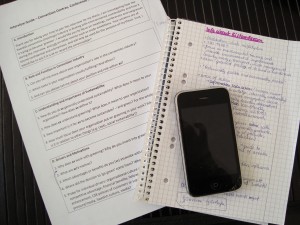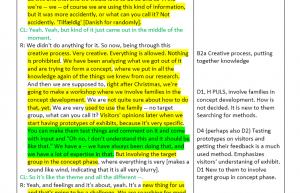No matter whether you are a bachelor, master or no student at all – we always have to ask questions. To teachers, fellow students, and well sometimes even to random strangers who have some knowledge about a subject that we are interested in.
 I have been doing this recently, and will do so throughout the following months, in order to ”collect data” (that’s how the researcher calls it) for my master thesis. Today I would like to share a bit with you how I conduct my interviews and what could be important to remember when you do so someday.
I have been doing this recently, and will do so throughout the following months, in order to ”collect data” (that’s how the researcher calls it) for my master thesis. Today I would like to share a bit with you how I conduct my interviews and what could be important to remember when you do so someday.
Rule 1 – Advertise yourself!
When you contact the company, organization or individual person you would like to interview, it is important to send an email that emphasizes why you want especially them to give you an interview and what contribution they are making. They need to be informed about the topic, but also motivated to participate. Appeal to their organizational ego, if neccessary, by writing something like ”I believe your organization can contribute valuable knowledge not only to this thesis but also to society”. – Don’t we all like compliments? Don’t make the email too long though!
Rule 2 – Come prepared!

Never go to an interview without knowing anything about the company or person, what they are working with, and especially information that relates to your topic, which you can already find online. An interview guide is a standard that many researchers bring to remind them of the important questions to ask, keep the red line of the interview and get back on track if a respondent talks about everything and anything. Having checked the company’s website before can also help you in asking for other relevant material (e.g. corporate policies) and other interesting people to interview. And don’t forget to go through your interview guide several times before the actual interview – you need to know it in your sleep! Ask friends or your supervisor to have a look at the questions as well – do they all make sense, are they confusing, are they repetitive?
Rule 3 – Have your equipment ready!
Oh yes! Yes yes yes. Important! Having learned from failure, such as phones that suddenly did not record or stopped recording because the memory was full – a true nightmare for any researcher – always check your equipment! No one can of course remember information from a 1-hour-interview, so ask the respondent if you are allowed to record it – with your phone or maybe even a dictaphone if you have. But do take some notes as well, if something very interesting comes up that you might want to ask again later. And as soon as possible transfer the audio file to your hard drive and other backup locations.
Rule 4 – Ask the right questions!
Well, usually you think there are no wrong (or stupid) questions, just wrong answers – but in interviewing it is very important to ask the right questions. This means asking questions that really get you the information you need to fulfill your research aim, but also asking questions that do not steer the person in their answers so much. So try to avoid biased questions such as ”Do you think child labour is bad?” and rather ask open questions like ”What do you think about child labour?”
Rule 5 – Take your time!

This applies both to during the interview, where it is important to really keep asking when you feel you haven’t gotten what you need, and to after the interview. Because after the interview the actual fun begins: transcribing! This means that you will listen to the interview and write down what everybody said, even including interrupted sentences and for example laughter. This is a long and quite boring process. For 10 minutes interview you will need about 1 hour to transcribe. So for a 1-hour or 90-minute interview, schedule a whole day for the transcriptions. Nevertheless this is a beneficial process because you already go through the ”data”, which makes your head already start analyzing it. Later then you will usually ”code” your interview, i.e. indicating for which issue this section or answer is relevant. So this step is a great help for the rest of the research project.
Although this might seem a bit scary, don’t be afraid to conduct your own research! The results can be very interesting and rewarding and you will learn a lot by doing it!
So good luck! =)
